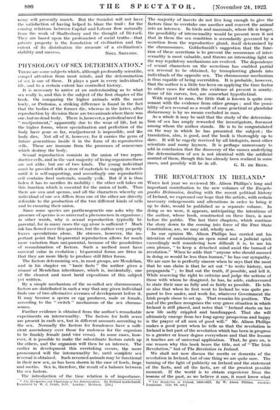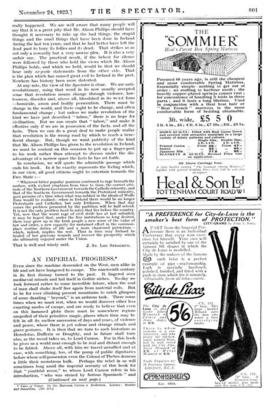THE REVOLUTION IN IRELAND.* WHEN last year we reviewed Mr.
Alison Phillips's long and important contribution to the new volumes of the Encyclo- paedia Britannica, dealing with the recent political history of Ireland, we expressed our hope that the article, with certain necessary enlargements and alterations in order to bring it up to date, would be published as a separate volume. In doing so we were, it appears, anticipating the intentions of the author, whose book, constructed on these lines, is now before the public. The last three chapters, which continue the story down to the coming into force of the Free State Constitution, are, we may add, wholly new.
In our opinion Mr. Alison Phillips has carried out his intention of maintaining an open mind and a judicial spirit exceedingly well considering how difficult it is, to use his own phrase, " to keep a detached mind amid the turmoil of revolution." When he adds that "anyone who should succeed in doing so would be less than human," he has our sympathy. We are sure he is perfectly sincere when he says that the most that he can claim is that he set out " to write history, not propaganda " ; to find out the truth, if possible, and tell it. While reserving the right to criticize and judge the actions of those with whom he disagreed, he has, he adds, endeavoured to state their case as fully and as fairly as possible. He tells us also that when he first went to Ireland he was quite pre- pared to live under, and work for, whatever Government the Irish people chose to set up. That remains his position. The end of the preface recognizes the very grave situation in which Ireland is still placed, and notes that " Ireland starts on her new life sadly crippled and handicapped. That she will ultimately emerge from her long agony prosperous and happy is the prayer of all men of good will." Mr. Alison Phillips makes a good point when he tells us that the revolution in Ireland is but part of the revolution which has been in progress to a greater or lesser degree everywhere and that the lessons it teaches are of universal application. That, he goes on, is one reason why this book bears the title, not of " The Irish Revolution," but of The Revolution in Ireland.
We shall not now discuss the merits or demerits of the revolution in Ireland, but of one thing we are quite sure. The turning of the light of publicity on Ireland and the statement of the facts, and all the facts, are of the greatest possible moment. If the world is to obtain experience from the lessons of the past, as we believe it can, it must know what
• The Revolution in Ireland. 1908-1923. By W. Alison Phillip.. Loader': Loninnans. [12s. 11d. net.]
really happened. We are well aware that many people will say that it is a great pity that Mr. Alison Phillips should have thought it necessary to rake up the bad things, the stupid things and the cruel things that have been done in Ireland during the last ten years, and that he had better have left the lead past to bury its follies and its dead. That strikes us as not only a cowardly but a very unwise plea. It is also a very unfair one. The practical result, if the behest for silence were followed by those who hold the views which Mr. Alison Phillips holds, and which we hold, would be that we should hear only ex-parte statements from the other side. That is the plan which has caused great evil to Ireland in the past.
Nowhere has history been more distorted.
At any rate, the view of the Spectator is clear. We are anti- revolutionary, using that word in its now usually accepted sense that revolution means change through violence, law- lessness, disorder and, above all, bloodshed in its wcrst form —homicide, arson and bodily persecution. There must be change in the world, and there ought to be change, and often fundamental change ; but unless we make revolution of the kind we have just described " taboo," there is no hope for civilization. But we can create that " taboo," and make it effective only if we are in possession of the facts, and all the facts. Then we can do a great deal to make people realize that revolution is the wrong road by which to reach a bene- ficent change. But, though we want publicity of the kind that Mr. Alison Phillips has given to the revolution in Ireland, we must be content on this occasion to put up a finger-post to his work rather than attempt to discuss under the dis- advantage of a narrow space the facts he has set forth.
In conclusion, we will quote the admirable passage which ends his book. In it he exactly represents the feeling which, in our view, all good citizens ought to entertain towards the Free State :-
"Whatever bitter popular passions continued to rage beneath the surface, with violent eruptions from time to time, the correct atti- tude of the Northern Government towards the Catholic minority, and that of the Southern Government towards the Protestant minority, gave promise of a time when what was noblest in the ideals of Wolfe Tone would be realized—when in Ireland there would be no longer Protestants and Catholics, but only Irishmen. When that day comes the problem presented by the partition. will be half solved. It is not the only problem hard to solve that lies before the country. Yet, now that the worst rage of civil strife has at last subsided, it may be hoped that, under the free institutions so long desired, there may grow up in the Irish people a new sense of the value of law and order, a new capacity for sustained effort in the common- place routine duties of life and a more chastened patriotism— which, indeed, implies the rest. Thus in time may Ireland be healed of her grievous wounds and recover the prosperity which she ultimately enjoyed under the Union.



















































 Previous page
Previous page